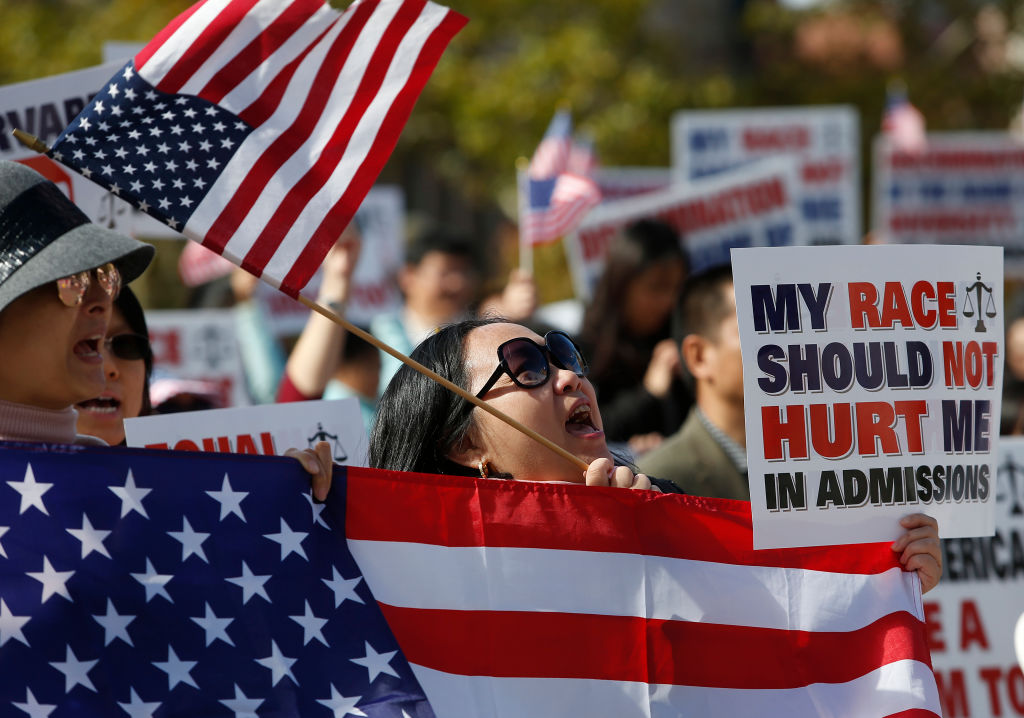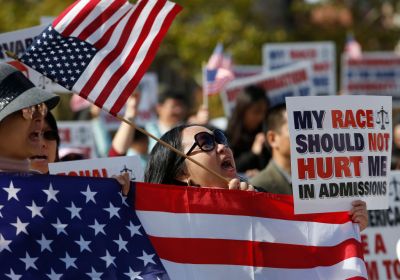The Supreme Court will hear oral arguments today in a pair of cases that could overturn contentious precedents dating back to the 1970s.
Sound familiar?
Last term, the court’s Dobbs decision overturned the federal abortion status quo. This year, race-based affirmative action in college admissions is on the docket.
Both cases before the court today have the same plaintiff: Students for Fair Admissions, which describes itself as “a nonprofit membership group of more than 20,000 students, parents, and others who believe that racial classifications and preferences in college admissions are unfair, unnecessary, and unconstitutional.” The group was founded by Edward Blum, an activist who has been involved in several past Supreme Court cases related to racial discrimination.
Blum hopes “the justices restore the original principles of our civil rights movement,” he told The Dispatch. “And those principles are, a student shouldn’t be helped or harmed by their race when applying to college.”
The two defendants are the University of North Carolina and Harvard University. Although the court originally agreed to hear arguments for the cases together, it later decided to separate them. Justice Ketanji Brown Jackson is recusing herself from the Harvard case, given her past position on Harvard’s Board of Overseers.
In the Harvard case, the plaintiffs allege that the university has systematically discriminated against Asian Americans in the admissions process, including by rating Asian American applicants lower for positive personality traits. Since the Supreme Court’s decision in Regents of the University of California v. Bakke (1978), racial quotas in admissions have been illegal—but SFFA says Harvard is functionally applying one.
The UNC case also raises the question of whether a university can reject a race-neutral alternative to race-based affirmative action without first proving that the alternative would cause a “dramatic sacrifice” in academic quality or the educational benefits of diversity. UNC will likely argue (as it has before) that ending race-based affirmative action would “materially weaken the education offered by UNC … and diminish the capacity of their graduates to work and lead effectively in the 21st century.”
The separation of the cases could also enable the justices to parse the nuances of slightly different questions at issue in each: For instance, as a state university, UNC is bound by the Equal Protection Clause of the 14th Amendment in a way that Harvard, as a private institution, is not.
But the two cases are more similar than they are different, with SFFA arguing that the universities’ admissions decisions violate Title VI of the Civil Rights Act, which provides that “no person in the United States shall, on the ground of race, color, or national origin, be excluded from participation in, be denied the benefits of, or be subjected to discrimination under any program or activity receiving Federal financial assistance.” A decision in the plaintiffs’ favor in either case would likely overturn prior precedents such as Bakke and Grutter v. Bollinger (2003).
Those cases gave institutions that receive federal funding the right to consider race as a “factor” but not set racial quotas. But under the Equal Protection Clause, racial discrimination is subject to “strict scrutiny.”
“In very loose terms, the state has to have a compelling reason for this kind of racial discrimination, and if there’s any less discriminatory way to achieve the objectives, then the state needs to pursue that course instead,” AEI legal scholar Adam White said.
The plaintiffs are likely to argue that the universities have neglected to pursue those “race-neutral alternatives.” Examples of such alternatives could include courting first-generation applicants or ending legacy admissions, a system that privileges applicants whose parents or siblings attended the university.
“Increased utilization of non-race-based criteria, such as socioeconomic preferences, can promote diversity about as well as racial preferences,” SFFA wrote in its district court brief in the Harvard case. “This approach is particularly effective when combined with increased use of financial aid, scholarships, and recruitment to attract and enroll minority applicants and the elimination of admissions policies and practices, such as legacy preferences and early admission, which operate to the disadvantage of minority applicants.”
The universities will likely argue that the race-neutral alternatives don’t work as well at doing what race-based affirmative action is supposed to do: “remedy[ing] the results of … prior discrimination.” The universities of California and Michigan have both filed amicus briefs in the UNC case to that effect.
It’s hard to predict how the Supreme Court will rule on any given case before oral arguments. “But seeing the arguments in the briefs, and knowing the justices’ past statements on these issues, it seems to me extremely likely that the plaintiffs will win on their Civil Rights Act claim,” White said.
One CNN writer called affirmative action “the legal equivalent of a dead man walking,” and that seems to be the consensus view—but that doesn’t mean the court will overturn the affirmative action precedents outright. In the New York Times, Yale law professor Jacob Driver homes in on one particular line from Sandra Day O’Connor’s majority opinion in Grutter: “We expect that 25 years from now, the use of racial preferences will no longer be necessary.” Driver speculates that if two conservatives joined the court’s liberal wing in giving legal weight to O’Connor’s timeline, race-based affirmative action could be extended through 2028, giving colleges time to adjust to the new status quo.
Justices aren’t supposed to be swayed by public opinion, but it’s worth noting that Americans broadly oppose race-based admissions, even in blue areas. California voters, for example, rejected a 2020 ballot initiative to overturn the state’s ban on affirmative action by a nearly 15-point margin. While Gallup has found that a majority of Americans say they favor “affirmative action” for minorities, a recent Pew survey found that large majorities—including 79 percent of white respondents and 59 percent of black respondents—say that race should not be a factor in college admissions.
“These policies, while very popular among university administrators and state officials, do not seem to be very popular among the public,” Zachary Bleemer, a Yale economist, said. “And so I don’t think you’d expect to see the kind of backlash that you’ve seen in the case of Roe v. Wade.”






Please note that we at The Dispatch hold ourselves, our work, and our commenters to a higher standard than other places on the internet. We welcome comments that foster genuine debate or discussion—including comments critical of us or our work—but responses that include ad hominem attacks on fellow Dispatch members or are intended to stoke fear and anger may be moderated.
With your membership, you only have the ability to comment on The Morning Dispatch articles. Consider upgrading to join the conversation everywhere.